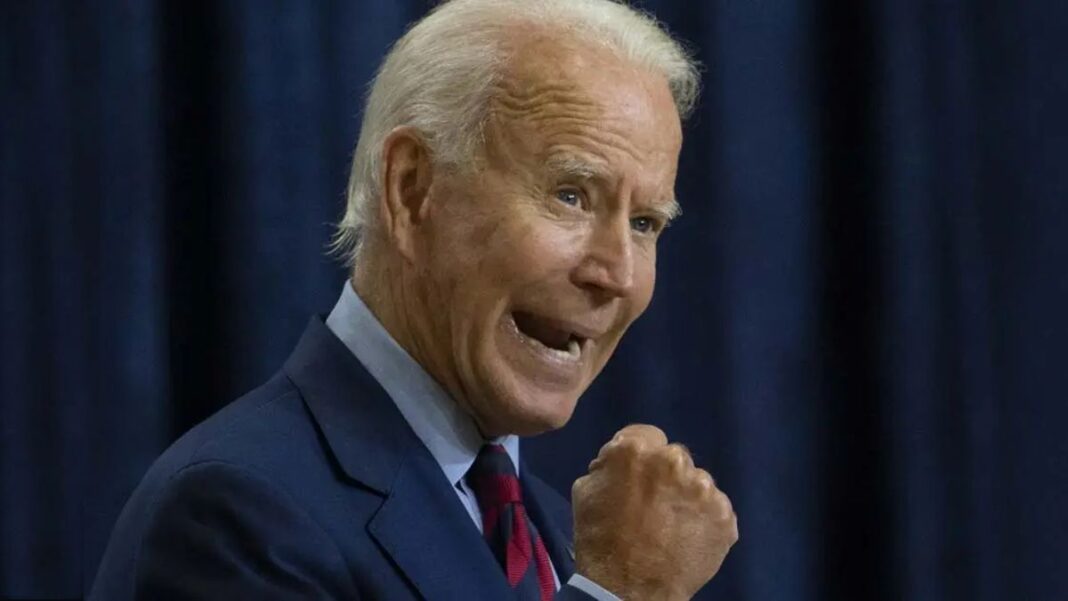The Biden administration is claiming Congress, by its enactment of national emergency statutes, has given the president the power to unilaterally control all aspects of life in America. A year ago, it locked down the country for COVID. In August it forgave $600 billion of student loan debt. Next it will regulate the entire economy in the name of climate change. Scary as these scenarios might be, Congress, in a state of irrelevancy, might have given the president these powers. If Congress does not revoke these emergency powers and reclaim its legislative authority, we are certain to live under tyranny. ~ William L. Kovacs, The author
August 23, 2022 President Biden forgives $600 billion of student loan debt. His asserted authority is the 2003 Higher Education Relief Opportunities for Students Act (“HEROES”), which “authorizes” such power to address the financial harms caused by a national emergency. The continuing national emergency is COVID.
Biden is also contemplating the designation of climate change as a national emergency. If such a declaration is lawful, it would allow his administration to shut down the economy of the United States. Biden recently called climate change a “clear and present danger,” vowing to use unspecified executive powers to address it. The likely asserted authority will be the International Emergency Economic Powers Act (“IEEPA”).
How can a president have such powers under our Constitution? There is a simple answer. Congress has granted many emergency powers to the Executive. And unfortunately, in a divided Congress, it cannot revoke them.
There are 126 laws passed by Congress authorizing the President to use so-called “national emergency powers.” These laws allow U.S. Presidents to keep this nation in a perpetual national emergency. President Biden knows how to use these powers; Congress does not know how to reclaim them.
Since the start of his presidency, Biden has aggressively used emergency powers. He extended President Trump’s national emergency order indefinitely on the COVID pandemic. Relying upon emergency public health powers, Biden mandated that 84 million Americans subject to the Occupational Safety and Health Act either obtain a COVID-19 vaccine or submit to weekly testing. Biden also used the emergency powers to impose a nationwide eviction moratorium to stem the spread of COVID.
With little discussion, the U.S. Supreme Court struck down the mandatory employee COVID testing and eviction moratorium orders. However, the Court in West Virginia v. EPA (“WVA v. EPA”), an administrative law case involving climate change, issued a groundbreaking ruling that will likely determine the legality of future Executive overreach, including future declarations of national emergency. EPA attempted to regulate climate change using obscure and vague provisions of the Clean Air Act. The court held EPA “were [was] asserting highly consequential power beyond what Congress could reasonably be understood to have granted.”
The holding in WVA v. EPA will likely subject future emergency declarations to more intense scrutiny as to congressional intent. Such scrutiny is essential. Student debt cancellation is a perfect example of manipulating language. By isolating every word of the HEROES Act, e.g.; “wave” or “modify,” and separating the words from its legislative history and historical context, the Biden administration justifies its loan forgiveness declaration. Biden’s argument is simple – COVID placed students in a worse financial condition.
Designating some “happening” a national emergency allows the President to spend additional money and circumvent restrictions that might be imposed by law.
By designating “climate change” an emergency, Biden could order “…sweeping actions to restrain greenhouse gas production – such as banning U.S. crude oil exports, ending offshore drilling or speeding the manufacturing of electric vehicles.” Such actions could decimate world energy supplies and, likely, our economy.
These congressionally delegated emergency powers are so broad and vague they allow a U.S. president to suspend the Constitution until Congress either cuts off funding or the Supreme Court strikes down the emergency declaration.
While Congress has only one law designated “National Emergencies,” NYU’s Brennan Center identifies 136 laws that allow the President to declare a national emergency. Ninety-six of these laws require nothing more than the signature of the President on an emergency proclamation. Fifteen emergency laws have restrictions such as involving a specific subject matter or the need for armed forces. Only thirteen of these emergency laws require a congressional declaration of emergency.
These 136 emergency laws are part of a massive legal framework that contains over 3000 separate criminal offenses in 50 titles of the U.S. Code and 23,000 pages of federal law. That was the last count in 1980. More troublesome, the National Emergencies Act “…does not define what constitutes a national emergency.”
Without a definition, the statutory meaning of the term must be determined by the common meaning found in a dictionary. Merriam Webster defines a national emergency as “a state of emergency (an unforeseen circumstance needing immediate action) resulting from a danger or threat of danger to a nation from foreign or domestic sources and usually declared to be in existence by a governmental authority.” Such a subjective definition is determined through the eye of the beholder.
The troubling use of recent declarations is that they were invoked with scant factual findings to support the government’s actions. The public health emergency law referenced a waiver of a liability law for those assisting the federal government address COVID, i.e., protecting the pharmaceutical companies.
The only requirement to implement an emergency power is the President must specify the provision in any of the 136 laws under which he will act. The provision cited does not need to relate to the actions he takes. On this point, the decision in WVA v. EPA may change the outcome if the court forces the President to stay within the powers of the statute relied upon when declaring the emergency.
Congress must find a mechanism to terminate these emergency laws when they have served their purpose. Without such a mechanism, the emergency can be continued merely by the President issuing a declaration for it to continue. One option for terminating an emergency power is for Congress to terminate it by joint resolution. Since the President must sign joint resolutions, Congress needs a two-thirds majority to override a presidential veto. Without Congress being able to override a veto, these emergency powers are perpetual.
In addition to health emergencies, other powers available to the President include the ability to control airports, industrial facilities, and any device capable of emitting electromagnetic radiation, i.e., our communications system. The authority most used is IEEPA. It authorizes the President to invoke emergency powers relating to U.S. national security, foreign policy, or the economy, including financial and commercial transactions. The IEEPA has been invoked 55 times. Presidents can impose sanctions on individuals and countries, including freezing bank accounts and seizing assets. While the threat is required to be related to an activity in whole or part outside of the U.S., it is easy for a president to assert a foreign connection by claiming national security.
By enacting the National Emergencies Act and the 136 other statutes, Congress gives presidents the power to be a dictator at times of their choosing. There are only two practical ways to restrain a President’s use of emergency powers. The U.S. Supreme Court has demonstrated a willingness to curb the administrative state. Still, the legal process takes many years, and the outcome depends on the political leanings of the court.
A more powerful approach is for Congress to function as an independent check on the Executive, as envisioned in our Constitution. Unfortunately, as long as the members of Congress who are of the same party as the President serve as a president’s lapdogs, Congress is mostly irrelevant.
The only remaining viable option would arise when different political parties control the House and Senate. In this situation, the House of Congress, controlled by the party in opposition to the President’s party, could refuse to appropriate funding for the President’s power grab. Without both Houses of Congress agreeing to appropriate money for the emergency, the President has no means of paying for his power grab. In the final analysis, starving the dictator may be the only solution to save the Republic.








